Understanding the Key Role of Bearded Dragon Specialists


Intro
In the lively and diverse world of reptile care, bearded dragons have carved out a special niche. The appeal of these creatures goes beyond their distinctive appearance; they have a particular charm that captures the hearts of many pet owners. However, taking care of such unique reptiles isn't a walk in the park. This is where bearded dragon specialists come into play. They bring a wealth of knowledge and experience, ensuring these scaly friends lead healthy and fulfilling lives.
Bearded dragon specialists serve as the bridge between the intricate needs of these reptiles and their human caretakers. Possessing specialized knowledge, they understand the unique behavior, health requirements, and environmental needs of bearded dragons. The aims are simple: to improve the welfare of these creatures and to educate the owners, fostering a nurturing relationship that benefits both.
It’s critical to parse the various aspects that underscore the essential role of these specialists. We will explore their responsibilities, their impact on the health of bearded dragons, and the fruitful relationships they cultivate with pet owners.
Expertise in Reptile Care
Understanding Unique Needs
Each species of bearded dragon—whether it's the classic Centralian or the lesser-known Eastern—has its own quirks and necessities. Specialists are trained to recognize these distinctions, adapting care approaches to fit individual needs. They know that what works for one species might not suit another. Issues such as temperature control in habitats, dietary variations, and stress response can all differ based on species.
Healthcare Responsibilities
Healthcare is one of the critical domains of a bearded dragon specialist's expertise. They provide essential guidance on:
- Nutritional Needs: Specialists structure comprehensive diet plans that ensure dragons get the right mix of proteins, vitamins, and minerals. Certain insects, leafy greens, and supplements become staples of a healthy bearded dragon diet.
- Regular Check-Ups: Just like our furry friends, these reptiles benefit from routine health check-ups to monitor their overall condition and to catch potential problems early.
"Proper care extends beyond feeding; it involves observing changes in behavior and seeking timely interventions."
Habitat Maintenance
Creating an optimal habitat is another area where specialists shine. They provide insights on:
- Terrarium Setup: A well-structured habitat mimics the arid environments of the dragons' native Australia. Factors like temperature gradients, humidity levels, and safe hiding spots come into play.
- Environmental Enrichment: It’s not just about survival—it's about quality of life. Specialists recommend items such as climbing structures and hides to keep the bearded dragon engaged and active.
Education and Community Engagement
Role of Specialists in Education
Bearded dragon specialists do not just work behind closed doors. They extend their knowledge to the community, offering workshops and engaging in online forums where owners can share experiences and learn from one another. They understand that an informed owner leads to a healthier pet.
Community Outreach
Community involvement is often overlooked in the realm of pet care, yet it's crucial to the welfare of exotic pets. Specialists often participate in events to promote responsible ownership, engage with potential owners, and provide training workshops. Their commitment helps demystify the complexities of reptile care, cultivating a more informed pet-owning community.
Ending
As we peel back the layers surrounding the world of bearded dragons, it's clear that specialists are integral to their longevity and well-being. Their expertise covers a broad spectrum, encompassing specific care needs and health management while also fostering education and community engagement. The vital connection nurtured between these specialists and pet owners lays a foundation for thriving relationships—ones that ensure the joy of bearded dragons remains alive and well in homes across the globe.
Prolusion to Bearded Dragons
The world of bearded dragons is as fascinating as it is intricate. These reptiles are not just intriguing creatures with captivating behaviors; they also require specialized care that can only be provided by knowledgeable individuals. This segment opens the door to understanding the essential aspects of bearded dragon care, highlighting why their upkeep is critical for both the pets and their owners. By diving into the characteristics of bearded dragons, their popularity in the pet market, and the principles of their care, we set the stage for a more detailed discussion on the vital role specialists play in ensuring their health and happiness.
Brief Overview of Bearded Dragons
Bearded dragons, belonging to the genus Pogona, are native to the arid regions of Australia. Recognized for their distinct beard-like throat flap, which can puff up when they feel threatened or stressed, these reptiles have become quite the charmers in the reptile community. With several species, the most frequently kept in captivity is the central bearded dragon. They exhibit a variety of colors and patterns, which not only add to their allure but also provide a canvas for intentional breeding practices.
Bearded dragons thrive in warm environments and have specific dietary requirements that include a mix of insects, vegetables, and fruits. Proper care encompasses creating an appropriate habitat that mimics their natural settings—ample space for movement, precise temperature gradients, and UV lighting to sustain their well-being. Understanding these critical elements fosters a relationship where the needs of the bearded dragon are met, paving the way for a happy, healthy pet.
Popularity as Pets
In recent years, bearded dragons have surged in popularity as pets, charming reptile enthusiasts and new owners alike. Their docile nature and generally easygoing temperament make them suitable companions for reptile beginners and experienced keepers. Many people are drawn to their unique appearance and engaging behaviors.
Here are some reasons why bearded dragons stand out as preferred pets:
- Interactive Creatures: Bearded dragons exhibit endearing behaviors, such as head bobbing, arm waving, and basking in the sun. These actions create an engaging experience for pet owners who enjoy watching their pets’ antics.
- Relatively Low Maintenance: Unlike some exotic pets, bearded dragons don’t require complex care routines. Their habitat can be relatively simple to set up, compared to other reptiles like snakes or turtles.
- Educational Value: They allow their owners to learn about reptile care, ecology, and biology in an interactive manner. This educational aspect makes them a fun choice for children and adults wanting to deepen their understanding of reptiles.
Bearded dragons blend fun and education, making them eye-catching pets with a wealth of information just waiting to be discovered.
However, all this popularity should come with a caveat. New and aspiring owners often overlook the specialized knowledge required for their care. This is where the role of bearded dragon specialists comes into play. Specialists help bridge the gap between potential pet owners and the knowledge needed for proper care, ensuring that these reptiles lead fulfilling lives in their new homes.
The Importance of Specialist Knowledge
When it comes to the care of bearded dragons, having a thorough understanding of their needs is crucial. Bearded dragon specialists play a pivotal role in ensuring their well-being. Their expertise encompasses a range of factors from diet and housing to behavior and health issues. This section explores why their knowledge is vital for the overall health and happiness of bearded dragons, and how it translates into better care practices for these reptiles.
Understanding Species-Specific Needs
Every bearded dragon has its quirks. The needs of a Centralian bearded dragon, for example, differ significantly from those of a Coastal bearded dragon. Specialists understand these nuances, and their insights inform caretaking strategies that are tailored to specific species characteristics. This might include variations in temperature preferences, dietary requirements, or types of enrichment needed for a healthy life.
Key Considerations:
- Habitat and Environment: Different species might require varying elements in their tanks. A specialist can guide you on creating optimal habitats, providing temperatures, and substrates that mimic their natural environments.
- Dietary Needs: Specialists know the particular dietary needs of each species. Providing the right balance of insects, greens, and supplements can make all the difference in the dragon's health over time. They'll help you identify what foods to include—and also what to avoid. Not all greens are equal for bearded dragons!
- Social Dynamics: Understanding how different species interact can also influence how they should be housed. Some may thrive alone while others might be more social.
Without this specialized knowledge, bearded dragon owners risk making mistakes that can lead to health issues, stress, or even death.
Navigating Health Risks and Diseases
Bearded dragons, like any other pet, face a range of health risks. From metabolic bone disease to respiratory infections, the challenges can be daunting for an inexperienced pet owner. This is where the experience of a specialist becomes invaluable.
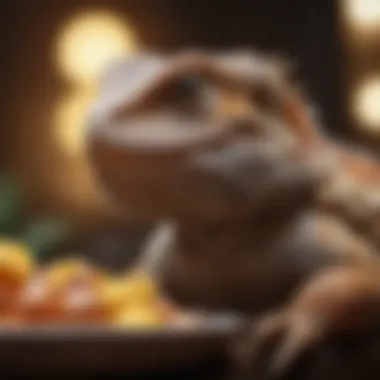
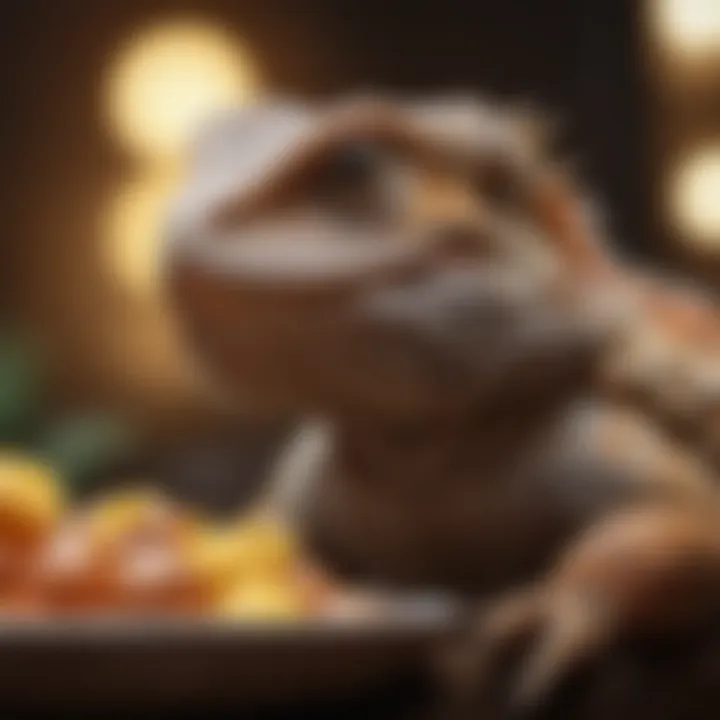
A bearded dragon’s health can often hinge on the early detection of problems, and specialists are trained to identify subtle signs of illness that an untrained eye might miss.
Why This Matters:
- Early Detection: Specialists can spot symptoms early, which can greatly improve treatment outcomes. For instance, recognizing signs of lethargy or changes in appetite can lead to prompt veterinary intervention.
- Structure of Care: They establish care protocols that help owners manage health risks effectively through regular check-ups, monitoring, and veterinary recommendations. This proactive approach can help mitigate potential issues before they escalate.
- Disease Prevention: Understanding disease transmission and prevention strategies is essential. Specialists often have knowledge of common pathogens that affect bearded dragons and can offer advice on maintaining a disease-free environment.
In summary, having a bearded dragon specialist at your side isn’t just a luxury—it’s a necessity for anyone serious about the well-being of their reptilian companion. Whether it’s making informed decisions about care, diet, or health management, their expertise can be a game-changer.
Educational Role of Bearded Dragon Specialists
The educational role of bearded dragon specialists cannot be overstated. They serve as crucial conduits of knowledge, aiding both new and seasoned pet owners in understanding the specific needs and behaviors of these reptiles. In a world where misinformation can spread like wildfire, having access to expert advice is invaluable, turning a potentially chaotic care experience into a smooth journey of companionship.
Providing Accurate Information
When it comes to bearded dragons, clarity is key. Bearded dragon specialists are equipped with comprehensive knowledge about various species-specific requirements, including diet, habitat, and health care. For instance, they can differentiate between the dietary needs of a baby bearded dragon and an adult one, ensuring that each stage of life is supported through proper nutrition. Without this guidance, an owner might inadvertently feed their pet the wrong food, leading to health issues down the line.
Specialists often provide resources that cover the dos and don'ts of bearded dragon care. They make it a point to address common myths, such as the idea that these reptiles can thrive on a purely vegetarian diet, which may lead to nutritional deficiencies. Instead, the specialists promote a balanced approach that includes insects and greens, tailored to the specific age and condition of the dragon.
Moreover, they can assist in interpreting behavioral cues. Understanding why a bearded dragon may be hiding or displaying certain behaviors can prevent unnecessary stress for both the pet and the owner. This nuanced insight plays a significant role in fostering a well-adjusted pet in a loving environment.
"A well-informed owner is a confident one; knowledge demystifies care and builds strong relationships between pets and their people."
Workshops and Community Events
Bearded dragon specialists often organize workshops and community events, a vital part of their educational mission. These gatherings provide invaluable hands-on learning experiences for owners and aspiring owners alike. Here, individuals can ask questions, receive live demonstrations on habitat setup, and engage with other enthusiasts.
Workshops can also cover topics like:
- Proper handling techniques to build trust
- Identifying signs of illness
- Creating enriching environments to stimulate natural behaviors
Community events serve as a platform for interaction. Owners can share their experiences, challenges, and victories, forging a supportive network around this unique hobby. This sense of community further emphasizes the specialist's role beyond mere information provision; they are facilitators of connection and understanding, helping to bridge gaps between newcomers and seasoned enthusiasts.
Health Care Provided by Specialists
The care of bearded dragons extends far beyond regular feeding and a relaxing spot under their basking light. Specialists play an essential role in maintaining the health of these ancient reptiles, ensuring they thrive. From routine health assessments to critical emergency procedures, specialists hold the keys to a well-rounded health management program for bearded dragons. The unique physiological traits and requirements of these reptiles mandate specialized care and vigilant monitoring.
When pet owners engage with specialists, they gain access to a wealth of knowledge that goes beyond just basic care instructions. The importance lies in having someone who understands the subtleties of bearded dragon health. Bearded dragon specialists know their body language, dietary needs, and environmental preferences like the back of their hand. This deep understanding can discern between normal behavior and signs of distress, allowing for prompt intervention and care.
Regular Check-Ups and Assessments
Routine health check-ups for bearded dragons cannot be understated. Much like a human going to a doctor for a yearly physical, these check-ups ensure that any potential health issues are caught early. During these assessments, specialists will conduct a thorough examination, evaluating the dragon’s weight, skin condition, and overall energy levels.
Regular visits could include:
- Physical Examinations: Specialists assess for any abnormal signs, such as swelling, discoloration, or injuries.
- Weight Monitoring: Maintaining a healthy weight is crucial. Specialists can identify weight loss or gain trends that might lead to bigger issues.
- Fecal Tests: Analyzing droppings can provide vital clues about internal parasites or other digestive issues.
Specialists also offer advice on refining diet based on the dragon’s life stage. For instance, juveniles require more protein compared to adults. Ensuring proper care in each life stage greatly impacts the animal's long-term health. It’s about keeping a finger on the pulse of the dragon’s well-being and making necessary adjustments based on individual needs.
Emergency Care Procedures
Despite the best preventive care, emergencies can still arise. Reptiles do not exhibit overt symptoms until things have escalated. This unique characteristic emphasizes the importance of having a specialist equipped to manage urgent health crises. Specialists are trained to act swiftly, employing knowledge on a wide range of medical interventions specific to bearded dragons.
Common scenarios that may require emergency care include:
- Respiratory Issues: Symptoms such as wheezing or difficulty breathing require immediate attention, as they can signal a serious condition.
- Digestive Blockage: If a bearded dragon is lethargic and does not eat, it may indicate a blockage, which specialists can swiftly diagnose and treat.
- Injuries from Falls or Confrontations: Bearded dragons can sustain injuries which might not be visible externally, similar to fractures or internal injuries.
Having a trusted bearded dragon specialist is crucial in these situations. They can provide life-saving interventions, administer medications, or even arrange for surgical procedures if necessary. Immediate access to knowledge and resources can mean the difference between life and death, and knowing whom to turn to in an emergency is a key benefit of working with a specialist.
Behavioral Insights and Training
Understanding the behavioral patterns and training needs of bearded dragons holds significant weight in their overall care and well-being. When pet owners grasp these insights, they can foster healthier interactions with a creature that is often misunderstood. Behavioral insights provide a window into the natural instincts and actions of bearded dragons, while effective training techniques empower owners to establish positive behaviors in a constructive manner.
Understanding Natural Behaviors
Bearded dragons, as reptiles, have a distinct set of behaviors that often differ from more common pets like dogs and cats. Recognizing these behaviors is crucial. For instance, these lizards exhibit a variety of actions that reflect their mood and health. Courtship displays, such as head bobbing and arm waving, can indicate not only mating readiness but also a social hierarchy among individuals.
It's important to observe these actions, as they can signal stress or comfort. When a bearded dragon flattens itself, it may feel threatened, while basking in light indicates that it is relaxed. Therefore, from a behavioral perspective, understanding these signals is essential in nurturing a pet's environment.
Here’s a quick overview of common behaviors:
- Basking: Absorbing heat from specific light sources for health.
- Digging: Often a sign of nesting or exploring.
- Color Change: Shifting colors can signal mood changes; for example, a darkening hue might indicate stress or illness.
Recognizing these natural behaviors can enhance the bond between the specialist, the owner, and the bearded dragon. Offering an environment that mirrors their natural habitat while catering to these behaviors ensures a happy, active lizard.
Effective Training Techniques
Training a bearded dragon isn't just about tricks or commands like you'd find in training dogs; it's about shaping a positive interaction and clear communication. Specialists provide invaluable guidance in this field, leading to the creation of a responsive and well-adjusted pet.
One effective method is positive reinforcement, where desired behaviors are rewarded. This could be as simple as offering a small treat when the dragon navigates an obstacle or allows for handling without stress.
Here are several techniques that can be employed:
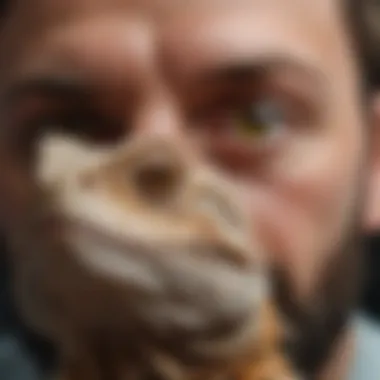
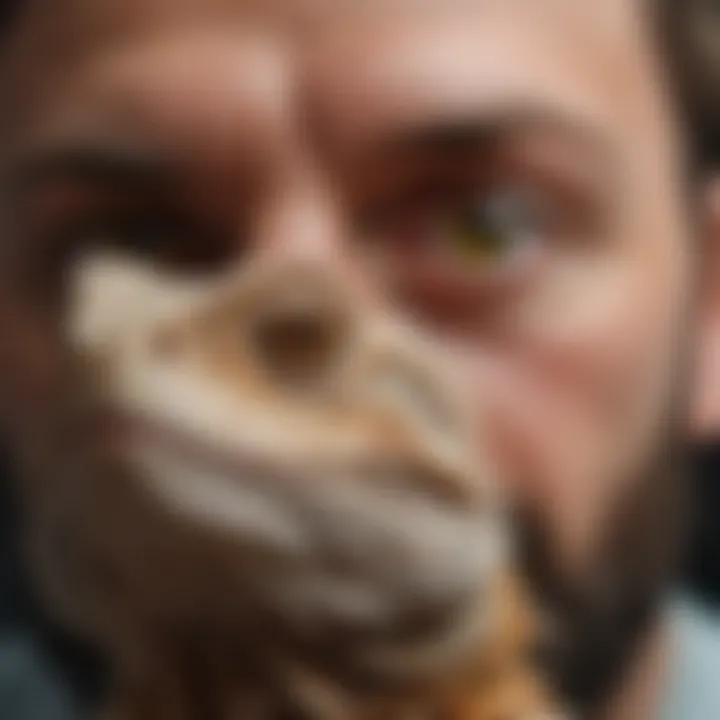
- Target Training: Using a stick or your finger to guide your bearded dragon to a specific spot, rewarding them for following the target.
- Step-Up Training: Encouraging the dragon to step onto your hand or arm, gradually increasing their comfort with handling.
- Desensitization: Slowly exposing them to stimuli that might be frightening, helping the dragon become accustomed to various situations gradually.
Establishing a routine is also beneficial. These reptiles thrive on consistency, and a structured day can help reduce anxiety. Consider integrating specific times for feeding, handling, and social interaction into their care regime. This approach not only supports their mental well-being but also enhances the relationship with the owner.
In the world of bearded dragons, behavioral insights and effective training techniques are intertwined. By prioritizing these aspects, specialists can cultivate a deeper understanding and foster a cooperative bond between lizard and owner.
"The right training techniques not only soothe the pet's nerves but also allow owners to truly enjoy their companionship."
In short, precious time invested in understanding and nurturing these behaviors pays off in the long run, resulting in happier, healthier bearded dragons.
Environmental Considerations for Bearded Dragons
When it comes to bearded dragon care, environmental considerations are often brushed aside - but they are vital in ensuring these reptiles not only survive but thrive. Understanding the unique habitat these creatures require leads to healthier, happier pets. The environment sets the stage for their growth, behavior, and overall wellness. It's the backdrop against which all aspects of their life unfold, making it imperative for any dedicated owner or specialist to pay close attention to this area.
Habitat Setup and Enrichment
Creating an appropriate habitat for a bearded dragon involves more than just a neat enclosure. It's crucial to mimic their natural habitat to the best that one can. These lizards hail from arid regions of Australia, where warm temperatures, dry conditions, and specific types of vegetation prevail.
Here’s what to consider in setting up a proper habitat:
- Vivarium Size: A smaller enclosure can stunt growth and lead to stress. Choose a tank that measures at least 40 gallons for an adult dragon. Bigger is often better, as long as the environment remains stable.
- Substrate: Sand or tiles can offer a safe ground for digging and basking spots. Avoid loose substrates that might be ingested.
- Hiding Spots: Provide rocks, logs, and other elements that allow the bearded dragon to feel safe. A secure hide helps reduce stress and gives them a place to retreat when they need a break from basking in the light.
- Climbing Structures: Bearded dragons love to climb. Utilize branches and unique climbing toys in the setup to keep them active and engaged.
- Enrichment Activities: You can add some simple enrichment activities like hiding food in different parts of the enclosure or placing small toys that encourage foraging. These activities stimulate both their mind and body.
The right setup not only caters to physical needs but also encourages natural behaviors, contributing significantly to their quality of life.
Temperature and Lighting Requirements
Temperature and lighting are two pillars of bearded dragon care. Unlike many pets, these lizards are ectotherms, meaning their body temperature depends on external sources. This raises some critical considerations that must be met:
- Basking Area: Create a basking zone with a temperature range of 100 to 110°F (37 to 43°C). A basking bulb will often do the trick but ensure it’s placed correctly to avoid overheating a specific spot.
- Cool Side: The cool side of the enclosure should remain around 75 to 85°F (24 to 29°C). This gradient allows the dragon to regulate its body temperature and provide comfort as they move between areas.
- UVB Lighting: Many owners underestimate the importance of UVB lighting. Without it, bearded dragons can become deficient in calcium, leading to metabolic bone disease. Install a UVB bulb over the basking area, ensuring it is replaced every six months for maximum efficacy.
- Light Cycle: Mimicking a natural light cycle is important, so aim for about 12 hours of light and 12 hours of darkness to keep your dragon's circadian rhythm in check.
In summary, environmental considerations for bearded dragons encompass more than just physical needs; they tie fundamentally into their overall well-being. By setting up their habitat effectively and ensuring the right temperature and lighting, specialists and pet owners can coexist in harmony with these fascinating reptiles. Proper environmental care lays the groundwork for a healthy, enriching life for bearded dragons.
Relationship Building Between Specialists and Owners
Building a strong relationship between bearded dragon specialists and pet owners is crucial for the health and well-being of these reptiles. The bond created not only fosters better communication but also enhances the overall experience of ownership, leading to happier and healthier bearded dragons. Trust is the foundation of this relationship, allowing owners to feel comfortable seeking guidance and advice from specialists who possess in-depth knowledge about these unique pets.
Fostering Trust and Communication
To foster trust, specialists must engage with pet owners in an open and approachable manner. Sharing knowledge about bearded dragon care, health, and behavioral aspects can significantly contribute to the owner's experience. When specialists prioritize clear communication, they create a space where owners feel empowered to ask questions without any hesitation.
- Listen Actively: Specialists should practice active listening, acknowledging concerns and queries voiced by pet owners. This reinforces confidence and makes owners feel valued.
- Be Transparent: Providing honest information about care routines and the features of bearded dragons establishes transparency. When owners understand the "why" behind recommendations, they’re more likely to follow the advice given.
In essence, cultivating a communicative environment helps bridge the knowledge gap, enabling owners to be more confident in their caretaking.
Providing Ongoing Support
Ongoing support from specialists is integral to maintaining a healthy dynamic in the relationship with owners. This involves consistent check-ins, educational newsletters, or offering resources that help owners keep track of their pet's care and health.
- Follow-Ups: Regular follow-ups can identify areas of improvement in care. Simple check-ins via email or phone can address new concerns or changes in behavior, reinforcing the bond between owner and specialist.
- Educational Resources: Offering literature, workshops, or links to reputable online platforms such as Wikipedia, Britannica, or forums on Reddit can empower owners with knowledge. This ongoing education can help them make informed decisions about their bearded dragon's health and environment.
Ongoing support isn't merely about resolving problems; it's about creating a community of informed pet owners dedicated to providing the best care possible.
The Role of Specialists in Breeding Success
Breeding bearded dragons presents a unique set of challenges and rewards, making the role of specialists crucial in this delicate process. These experts provide invaluable knowledge, ensuring not just the successful reproduction of these fascinating reptiles, but also the well-being of both the hatchlings and their parents. From understanding the right breeding techniques to managing genetic diversity, specialists are at the heart of responsible breeding practices. In an ever-evolving landscape of reptile care, they guide enthusiasts through the complex arena of breeding with care and precision.
Best Practices for Breeders
When it comes to breeding bearded dragons, there are several best practices that specialists emphasize to enhance success rates:
- Environment Control: Before even thinking about breeding, establishing the proper environment is paramount. This includes regulated temperature and humidity levels. Bearded dragons thrive in conditions that mirror their natural habitats. Specialists recommend a consistent basking area and a cooler section for balance.
- Nutrition: A healthy diet for both breeding pairs is non-negotiable. Specialists suggest a balanced diet rich in protein, calcium, and vitamins. High-quality feeder insects and greens should make up the majority of their diet.
- Pair Selection: Choosing the right pairs is essential. Specialists look for healthy dragons with good temperament and genetic diversity. This is vital to avoid inheritable health issues in future generations.
- Recording Data: Keeping a detailed record of breeding attempts, the health of the animals, and even the positioning can illuminate patterns that may emerge over time. Specialists recommend using journals or electronic spreadsheets for this purpose.
- Monitoring Behavior: Specialists stress the importance of observing the breeder's behavior during mating. Signs of stress can indicate an unsuitable pairing or environmental issues that need addressing.
Specialists not only impart these methods but also work alongside breeders to troubleshoot any issues as they arise, making their role not only informational but also experiential.
Genetic Considerations
Genetic considerations play a pivotal role in bearded dragon breeding, and specialists are best positioned to navigate this intricate field. Breeding blindly can lead to serious repercussions, such as inheritable diseases and abnormal physical traits.
- Genetic Diversity: One of the primary concerns is maintaining genetic diversity. Specialists underscore the risks of inbreeding, which can lead to a host of health problems including reduced immune response and various congenital issues.
- Understanding Traits: Bearded dragons showcase a variety of morphs, each with unique traits. Specialists are crucial in educating breeders about what traits can be passed down and how this can impact future offspring. Understanding whether to breed for specific qualities versus maintaining a healthier genetic pool is a nuanced decision that specialists help clarify.
- Testing for Hereditary Issues: Where necessary, specialists may also recommend genetic testing for prospective parents. This process can alert breeders to potential health risks that could be passed along the line.
- Long-term Breeding Planning: A specialist's job does not end with a breeding season. They often assist in crafting long-term breeding strategies, taking into consideration goals for traits, health, and environmental sustainability.
"A good breeder knows that the future of their line is not just in immediate success, but in laying the groundwork for generations to come."
Impact of Specialists on Community Perception
The understanding of bearded dragons and their care has evolved, thanks largely to the dedication of specialists in the field. Their role extends beyond simply advising individual pet owners; they actively shape the broader perception of these reptiles within the community.
Specialists serve as authoritative voices, helping enhance public knowledge about bearded dragons. They play a pivotal role in transforming misconceptions into a well-rounded understanding. For instance, there are many who think bearded dragons are as simple to care for as a hamster. However, specialists provide detailed insights into their dietary needs, behavioral nuances, and environmental requirements, dispelling myths and encouraging proper care practices among owners.
This educational outreach is essential not just for potential owners but for existing ones as well. It creates a ripple effect—when one pet owner gains knowledge, it often gets passed along to others, fostering a community that's informed and invested in the welfare of their pets.
"When you know better, you do better." This saying is especially true in the realm of bearded dragon ownership. Specialists ensure that owners are equipped with knowledge that can lead to healthier, happier reptiles.
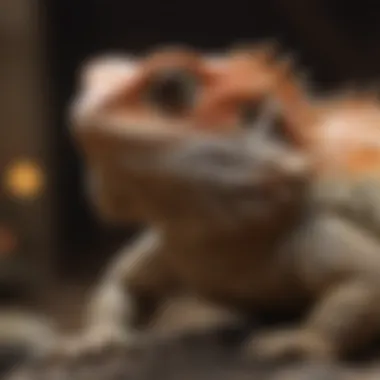
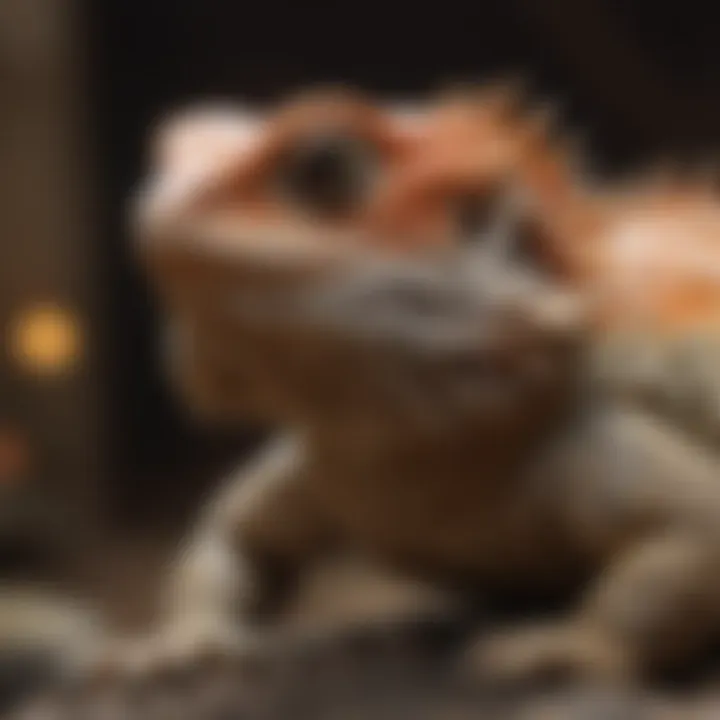
Moreover, their engagement doesn’t stop at education—specialists also inspire moral responsibilities among pet owners. They advocate for proper breeding practices, humane treatment, and sustainable ownership practices. This helps foster a culture where owners not only appreciate their pets but also commit to their lifelong care—often a significant task that requires time, effort, and resources.
Shaping Public Understanding
One of the crucial facets of specialists’ work is the active effort to shape public perception about bearded dragons. This involves conducting workshops, engaging with local communities, and sometimes facilitating school programs to educate younger audiences about reptiles.
By addressing common myths, such as the belief that bearded dragons are low-maintenance, specialists help set realistic expectations. They offer guidance on how to create an appropriate habitat, emphasize the importance of vitamin-rich diets, and discuss potential health risks that may arise due to negligence or ignorance.
Additionally, making use of social media platforms like Facebook and Reddit, specialists can reach a wider audience, allowing for discussions and interactive Q&A sessions. This direct line of communication helps clarify doubts and provides a platform to share success stories, further normalizing responsible pet ownership.
Promoting Responsible Ownership
Promoting responsible ownership is the heart of what specialists do. They don't just inform; they inspire action. By offering comprehensive resources and tools, specialists ensure that prospective and current owners are well-equipped to provide the best care for their bearded dragons.
- Workshops: They host workshops focusing on proper care techniques and behavioral training, allowing owners to learn and practice in real-time.
- Community Engagement: Participation in local pet fairs allows specialists to connect with pet owners directly, thereby addressing their concerns and enhancing communal knowledge on bearded dragon care.
- Online Resources: By creating informational content online—like articles, videos, and webinars—they reach individuals who may not be able to attend physical events. This is especially impactful for reaching people in remote areas where access to specialists may be limited.
Through these initiatives, specialists help to cultivate a sense of responsibility among owners, encouraging them to commit to their pets' well-being. This isn't merely about having a reptile as a pet; it's about forming a lasting relationship with a living creature that depends on its owner for everything from food to companionship.
Challenges Faced by Bearded Dragon Specialists
Bearded dragon specialists play a crucial role in the successful care and well-being of these unique reptiles. However, like any other field, they face a set of distinct challenges. Understanding these challenges is essential for both the specialists and pet owners. This section sheds light on the various obstacles faced by specialists, which can directly affect the quality of care provided to bearded dragons.
Addressing Common Misconceptions
A significant hurdle for bearded dragon specialists is the plethora of misconceptions surrounding bearded dragons themselves. Many pet owners might assume that these reptiles have straightforward care needs, but the reality diverges sharply.
For instance, some owners may think that since bearded dragons are omnivores, a simple diet consisting of commercial pellets suffices. However, they need a varied diet that includes fresh vegetables, fruits, and live insects. Moreover, many people overlook the necessity for a proper UVB lighting setup, mistakenly believing that ambient room light is enough.
In addressing these misconceptions, bearded dragon specialists must invest time in educating pet owners. This involves providing clear and concise information, often employing visual aids to illustrate dietary needs or habitat setups. While it can feel like a constant uphill battle, the rewards of fostering a well-informed community are immense.
Resource Limitations
Another pressing issue for specialists is the limitations in resources available to them. This encompasses financial resources, professional training opportunities, and even access to quality veterinary care specifically tailored for reptiles.
While larger veterinary practices might cater to cats and dogs extensively, reptiles often get a chilly reception. Finding specialists who are well-versed in reptile care can be a daunting task. Plus, budget constraints often restrict the purchase of high-quality supplies, such as enriched habitats or effective feeding materials.
This situation creates a domino effect; when specialists cannot access proper resources, it can hinder their ability to provide optimal care for bearded dragons. Furthermore, specialists often have to navigate the complexities of sourcing information about the latest advancements in reptile care without sufficient support from institutions or the industry.
Despite these challenges, it's vital for bearded dragon specialists to remain resilient. By fostering partnerships with reptile-focused organizations or advocating for greater awareness in veterinary medicine, they can help pave the way for better understanding and care standards in the future.
"The success of bearded dragon care relies heavily on the knowledge and support of specialists; addressing misconceptions can significantly improve the pet owner experience."
Through their continuous education efforts, specialists can address these barriers, ensuring a healthier, happier life for bearded dragons while nurturing responsible ownership.
Future Trends in Bearded Dragon Care
The sphere of bearded dragon care is changing, and these shifts carry substantial implications for the well-being of our scaly companions. As the landscape of veterinary medicine and animal husbandry evolves, so does the understanding of how to provide optimal care for bearded dragons. This section will delve into significant trends that are shaping the future of bearded dragon care and highlight why keeping an eye on these developments is crucial for both specialists and pet owners alike.
Advancements in Veterinary Medicine
Modern veterinary medicine is constantly evolving, bringing new insights and techniques to the care of bearded dragons. One notable advancement is the use of telemedicine, which enables owners to consult with reptile specialists remotely. This technology has its benefits; it allows for immediate advice and guidance without the need to transport a potentially stressed lizard. Moreover, specialists can monitor the condition of dragons more closely through digital platforms.
In a more technical vein, developments in diagnostic tools have transformed how veterinarians assess health issues. Non-invasive methods, such as ultrasound and MRI, are becoming more commonplace. These technologies can help detect problems that once required exploratory surgery. This is a game-changer in reptile healthcare, as it minimizes stress and risk for these delicate creatures.
Moreover, vaccination protocols are being refined. As specialists learn more about the immune systems of bearded dragons, tailored vaccines may soon become the norm, protecting pets from common diseases while enhancing their overall health.
These advancements invite both care and consideration. Pet owners must stay informed about new veterinary services and treatments. An educated owner is far more likely to notice changes in their pet's behavior or health, enabling quicker action when needed.
Emerging Research and Innovations
The field of bearded dragon care is also being significantly influenced by ongoing research. As scientists and specialists continually study these reptiles, fresh insights into their biology, behavior, and ecology emerge. Such research is invaluable, as it directly translates into better care practices.
For example, studies on the nutritional needs of bearded dragons are leading to the creation of specialized diets that could reduce health problems seen in many captive lizards. A clear understanding of calcium and vitamin D3 requirements is pivotal in preventing metabolic bone disease, which is often seen in under-cared pet dragons.
Behavioral research is another area where developments are promising. This research helps specialists design environments that meet the psychological needs of bearded dragons, contributing to their overall happiness and longevity. When owners understand their pets better, they can create more enriching habitats, helping to reduce stress and promote natural behaviors.
Additionally, innovations in habitat technology, such as smart thermostats and automated lighting systems, are making it easier for pet owners to maintain optimal living conditions. With the advent of such tools, monitoring temperature and humidity levels can be done with greater precision, mitigating risk factors associated with improper care.
In summary, staying abreast of these trends will empower owners to make the best choices for their bearded dragons, ensuring they receive the highest standard of care possible.
In the end, understanding future advancements in bearded dragon care isn’t just about keeping pets happy and healthy. It’s also about fostering a community of informed owners and professionals who advocate for the welfare of these unique reptiles, ensuring their needs are met for generations to come.
Culmination
Summarizing the Role of Specialists
Bearded dragon specialists play a vital role in the care and, ultimately, the well-being of these fascinating reptiles. Their expertise encompasses a wide array of important areas, from understanding the specific health requirements to ensuring that social interactions are appropriately managed. Even some basic care aspects can be quite intricate when it comes to bearded dragons; microbiomes, dietary needs, and habitat configurations need to be meticulously monitored. The specialist’s familiarity with these elements allows them to create tailored care regimens that can significantly enhance a bearded dragon's quality of life. Their participation not only benefits the individual reptile but also fosters a greater appreciation of these unique creatures within the community at large.
Moreover, specialists also have the responsibility of educating owners about the signs of distress or illness in their pets. They equip owners with the knowledge to observe behavioral changes that might indicate problems, ensuring early intervention can be achieved. This emphasizes the collaborative nature of pet ownership, where specialists and owners work hand in hand to secure the health and happiness of these remarkable creatures.
Encouraging Collaboration in Pet Ownership
Encouraging collaboration in pet ownership is not just a matter of fostering a good relationship between specialists and owners; it's about creating a supportive ecosystem in which each party benefits. When new owners enter the pet ownership arena, they often come with a host of questions and concerns. Specialists can bridge the knowledge gap by providing thorough, understandable framework on care practices, habitat needs, and diet that mitigate the risk of common pitfalls.
When proprietors realize they are not left to navigate the complexities of care alone, confidence grows. This leads to better engagement in community events, online forums, or even local initiatives, which can strengthen the understanding of bearded dragons as pets and enhance the bond between pet and owner. A culture of sharing tips and experiences flourishes, ensuring that the wisdom of seasoned specialists permeates the new and aspiring pet owners.
In essence, specialists serve as anchors in the often turbulent waters of exotic pet care, guiding pet owners toward a stable, informed, and rewarding experience. They encourage not just education but also camaraderie among users, promoting a community that thrives, shares insights, and contributes to the common goal of championing the welfare of bearded dragons and their future generations.















